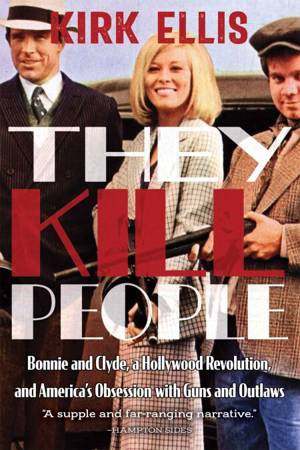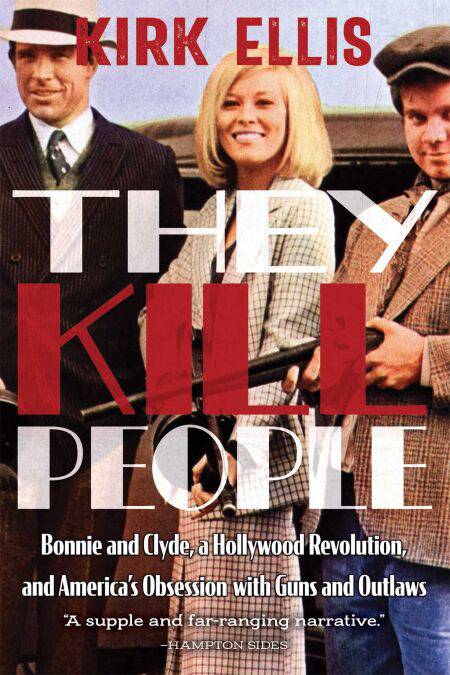
- Retrait gratuit dans votre magasin Club
- 7.000.000 titres dans notre catalogue
- Payer en toute sécurité
- Toujours un magasin près de chez vous
- Retrait gratuit dans votre magasin Club
- 7.000.0000 titres dans notre catalogue
- Payer en toute sécurité
- Toujours un magasin près de chez vous
They Kill People EBOOK
Bonnie and Clyde, a Hollywood Revolution, and America's Obsession with Guns and Outlaws
Kirk Ellis
Ebook | Anglais
22,36 €
+ 22 points
Description
A deep dive into the grit and glamor of America’s favorite criminal couple and the nation’s love affair with guns.
On May 23, 1934, two borderline inept but ruthless criminals named Clyde Barrow and Bonnie Parker met their end in a hail of semiautomatic gunfire on a rural road in the Louisiana backcountry. The duo had terrorized Depression-era Middle America with a string of robberies and a brazen daylight prison escape, killing nearly a dozen police officers along the way.
A legend was born.
Thirty-two years later, a movie crew gathered on a Warner Bros. studio ranch to re-create the scene of Bonnie and Clyde’s violent demise. It was the end of a difficult shoot. Almost everyone involved knew they were on to something, but getting there had taken a toll on relationships both professional and personal.
The result was destined to become what is arguably the landmark film of the New Hollywood era. Nothing like it had ever been attempted anything similar had, in fact, been forbidden by censorship. When the lights finally came up after an agonizing moment of black, Hollywood would never be the same. Almost sixty years since it exploded onto American screens, Bonnie and Clyde still retains the power to shock, amaze, and provoke, as fresh and relevant today as when it was first released in 1967. The movie’s resonance goes well beyond the peerless filmmaking of director Arthur Penn, producer-star Warren Beatty, and their talented team of collaborators.
Bonnie and Clyde taps into a dark wellspring in the American psyche. Produced in a time of great social upheaval, with a country divided under a deeply polarizing president, the film addresses troubling questions about our country’s founding myth and its obsession with firearms, questions that remain part of our national debate.
They Kill People is the story of the making of Bonnie and Clyde. It is the story of the outlaws whose real lives were anything but glamorous. Most of all, it is the story of how violence and a predilection for firearms became a fundamental part of American identity.
On May 23, 1934, two borderline inept but ruthless criminals named Clyde Barrow and Bonnie Parker met their end in a hail of semiautomatic gunfire on a rural road in the Louisiana backcountry. The duo had terrorized Depression-era Middle America with a string of robberies and a brazen daylight prison escape, killing nearly a dozen police officers along the way.
A legend was born.
Thirty-two years later, a movie crew gathered on a Warner Bros. studio ranch to re-create the scene of Bonnie and Clyde’s violent demise. It was the end of a difficult shoot. Almost everyone involved knew they were on to something, but getting there had taken a toll on relationships both professional and personal.
The result was destined to become what is arguably the landmark film of the New Hollywood era. Nothing like it had ever been attempted anything similar had, in fact, been forbidden by censorship. When the lights finally came up after an agonizing moment of black, Hollywood would never be the same. Almost sixty years since it exploded onto American screens, Bonnie and Clyde still retains the power to shock, amaze, and provoke, as fresh and relevant today as when it was first released in 1967. The movie’s resonance goes well beyond the peerless filmmaking of director Arthur Penn, producer-star Warren Beatty, and their talented team of collaborators.
Bonnie and Clyde taps into a dark wellspring in the American psyche. Produced in a time of great social upheaval, with a country divided under a deeply polarizing president, the film addresses troubling questions about our country’s founding myth and its obsession with firearms, questions that remain part of our national debate.
They Kill People is the story of the making of Bonnie and Clyde. It is the story of the outlaws whose real lives were anything but glamorous. Most of all, it is the story of how violence and a predilection for firearms became a fundamental part of American identity.
Spécifications
Parties prenantes
- Auteur(s) :
- Editeur:
Contenu
- Nombre de pages :
- 312
- Langue:
- Anglais
Caractéristiques
- EAN:
- 9780826369383
- Date de parution :
- 02-02-26
- Format:
- Ebook
- Protection digitale:
- Adobe DRM
- Format numérique:
- ePub

Les avis
Nous publions uniquement les avis qui respectent les conditions requises. Consultez nos conditions pour les avis.






